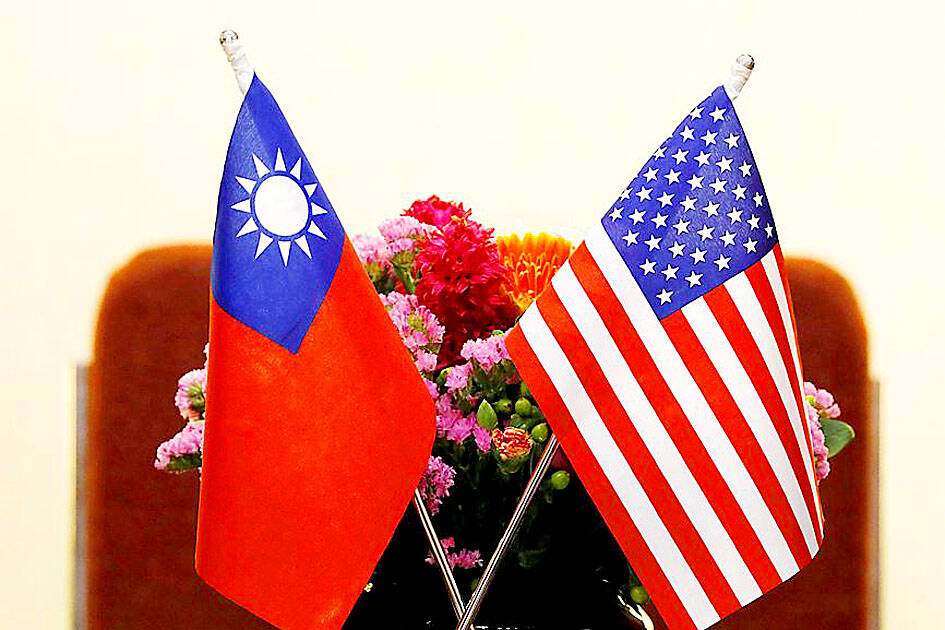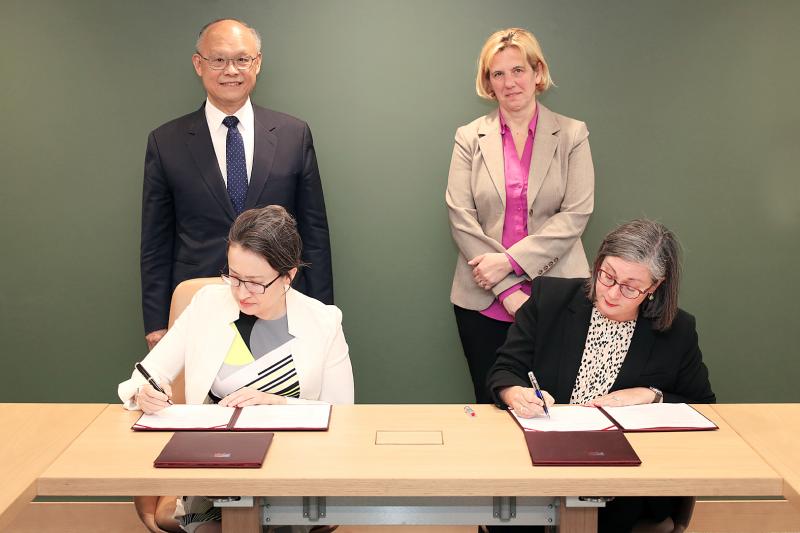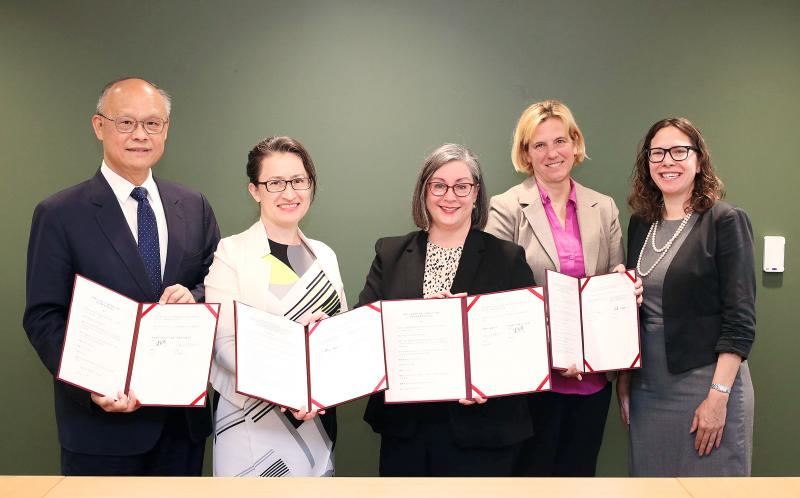Taiwan and the US yesterday signed an initial agreement under the US-Taiwan Initiative on 21st-Century Trade.
The agreement was signed yesterday morning by Representative to the US Hsiao Bi-khim (蕭美琴) and American Institute in Taiwan (AIT) Managing Director Ingrid Larson in Washington, the Office of Trade Negotiations in Taipei said.
The ceremony was witnessed by Minister Without Portfolio John Deng (鄧振中) and Deputy US Trade Representative Sarah Bianchi.

File Photo: REUTERS
Taiwan and the US started talks under the initiative in August last year, after Taipei was left out of the Washington-led Indo-Pacific Economic Framework.
“The deal that will be signed tonight is not only very historic, but also signals a new beginning,” Cabinet spokesman Alan Lin (林子倫) told reporters in Taipei yesterday.
“Relevant tasks are yet to be completed... Taiwan will continue to move toward a comprehensive FTA [free-trade agreement] with the United States to ensure Taiwan’s economic security,” Lin said.

Photo courtesy of the Office of Trade Negotiations
Officials from both sides have conducted two rounds of negotiations to finalize the initial agreement, which covers customs and trade facilitation, regulatory practices, domestic regulation of services, anti-corruption practices, and small and medium-sized enterprises.
The two sides are committed to working to facilitate bilateral trade and investment flows, improve regulatory practices, promote anti-corruption measures, and minimize unnecessary border formalities, the office said.
It does not cover tariff reductions or exemptions, but instead outlines practices and procedures aimed at streamlining and strengthening trade relations.

Photo courtesy of the Office of Trade Negotiations
The hope is that the initial agreement would be expanded to include other topics mandated in the initiative, such as agriculture, standards, digital trade, labor, environment, state-owned enterprises, and non-market policies and practices, the office said.
Business groups in Taiwan welcomed the deal, but urged both sides to resolve the issue of double taxation to reduce business costs.
On Thursday last week, US representatives Adrian Smith, Suzan DelBene, Nicole Malliotakis and Judy Chu (趙美心) introduced a bipartisan resolution calling for legislation to avoid double taxation between the US and Taiwan, one of the latest efforts by US lawmakers to ensure double taxation does not stand in the way of mutual investment.
Additional reporting by AFP

INVESTIGATION: The case is the latest instance of a DPP figure being implicated in an espionage network accused of allegedly leaking information to Chinese intelligence Democratic Progressive Party (DPP) member Ho Jen-chieh (何仁傑) was detained and held incommunicado yesterday on suspicion of spying for China during his tenure as assistant to then-minister of foreign affairs Joseph Wu (吳釗燮). The Taipei District Prosecutors’ Office said Ho was implicated during its investigation into alleged spying activities by former Presidential Office consultant Wu Shang-yu (吳尚雨). Prosecutors said there is reason to believe Ho breached the National Security Act (國家安全法) by leaking classified Ministry of Foreign Affairs information to Chinese intelligence. Following interrogation, prosecutors petitioned the Taipei District Court to detain Ho, citing concerns over potential collusion or tampering of evidence. The

Seventy percent of middle and elementary schools now conduct English classes entirely in English, the Ministry of Education said, as it encourages schools nationwide to adopt this practice Minister of Education (MOE) Cheng Ying-yao (鄭英耀) is scheduled to present a report on the government’s bilingual education policy to the Legislative Yuan’s Education and Culture Committee today. The report would outline strategies aimed at expanding access to education, reducing regional disparities and improving talent cultivation. Implementation of bilingual education policies has varied across local governments, occasionally drawing public criticism. For example, some schools have required teachers of non-English subjects to pass English proficiency

‘FORM OF PROTEST’: The German Institute Taipei said it was ‘shocked’ to see Nazi symbolism used in connection with political aims as it condemned the incident Sung Chien-liang (宋建樑), who led efforts to recall Democratic Progressive Party (DPP) Legislator Lee Kun-cheng (李坤城), was released on bail of NT$80,000 yesterday amid an outcry over a Nazi armband he wore to questioning the night before. Sung arrived at the New Taipei City District Prosecutors’ Office for questioning in a recall petition forgery case on Tuesday night wearing a red armband bearing a swastika, carrying a copy of Adolf Hitler’s Mein Kampf and giving a Nazi salute. Sung left the building at 1:15am without the armband and apparently covering the book with a coat. This is a serious international scandal and Chinese

TRADE: The premier pledged safeguards on ‘Made in Taiwan’ labeling, anti-dumping measures and stricter export controls to strengthen its position in trade talks Products labeled “made in Taiwan” must be genuinely made in Taiwan, Premier Cho Jung-tai (卓榮泰) said yesterday, vowing to enforce strict safeguards against “origin laundering” and initiate anti-dumping investigations to prevent China dumping its products in Taiwan. Cho made the remarks in a discussion session with representatives from industries in Kaohsiung. In response to the US government’s recent announcement of “reciprocal” tariffs on its trading partners, President William Lai (賴清德) and Cho last week began a series of consultations with industry leaders nationwide to gather feedback and address concerns. Taiwanese and US officials held a videoconference on Friday evening to discuss the